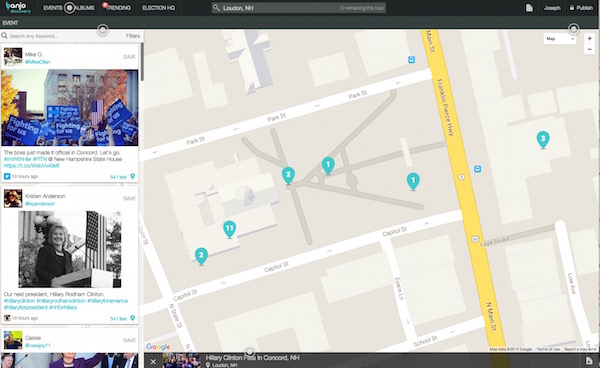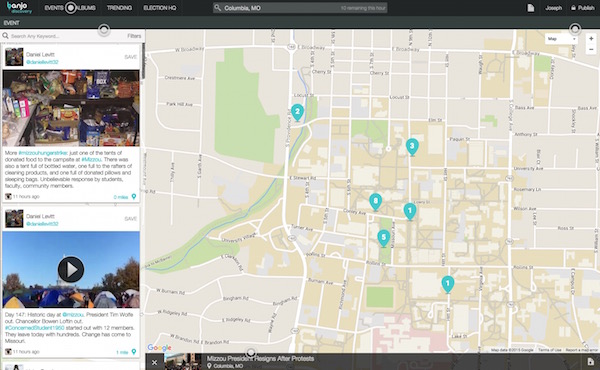While tonight’s Republican debate is being broadcast by the Fox Business Network, much of the conversation and coverage of the debate will, of course, occur on social media.
In an effort to help journalists sift through the torrent of user-generated content, Banjo, a social discovery app, on Tuesday released its Election HQ, a free dashboard that lets users follow each of the presidential candidates and track social posts that are coming out of their events.

Using Banjo’s software, which geolocates public feeds on more than 12 social networks, Election HQ hones in on the locations of the events, whether it’s the debate; or Marco Rubio holding a rally in Waukesha, Wisconsin; or Hillary Clinton filing her papers to get on the primary ballot in New Hampshire. Banjo also archives the events, and Election HQ users can search back to August to find past coverage.
“The user is able to click on any of the candidates and go deeper into specifics about where they are and what the content stream looks like of publicly posted geo located content coming from those areas,” said Victor Hernandez, Banjo’s director of media innovation.

The Election HQ dashboard is part of Banjo Discovery, a free product Banjo released in September, which is essentially a scaled-down version of the paid version of its software.
The free Banjo Discovery only lets users follow a handful of trending stories and make a limited number of searches per day for social content. The paid version also lets users download the content and use it for rebroadcast.

Hernandez wouldn’t specify how many people are using Discovery, but he said there are “a couple hundred newsrooms” currently signed up.
Banjo also has a staff of 20 or so at its office in Las Vegas that organizes the content and helps surface material that the Banjo software misses.
“When Hillary Clinton’s digital team is with her on the bus and traveling from stop to stop and they’re posting interesting content that is complementary to what we’re doing from these different events and rallies, perhaps those pieces of content aren’t geolocated, they’re not geo-enabled from their devices or from security reasons they’ve decided to not enable it, but there’s still value in including it in this bundled experience.”
Damien Patton, Banjo’s CEO, launched the company in 2011 and in May announced $100 million in new financing, five times what the company had raised up until that point.
In a profile in Inc. earlier this year, Patton explained his thinking about how Banjo has relevance in multiple industries:
Patton, who designed the technology and is the company’s de facto CTO as well as CEO, thinks of Banjo not as a simple consumer product but as a platform, an underlying intelligence that others will come along and tap into, build on. And he’s right that the implications of Banjo’s technology are almost incalculable for businesses as diverse as financial services, marketing, insurance, news and media, public health, and beyond. Because it combines location, photo classification, analytics, and the ability to “rewind” each social media network in time — so you can see what happened just before, say, an earthquake struck — Banjo points the way not only to a transformation in how we consume social media but also to a huge escalation of its utility and value.
To use Banjo Discover and the Election HQ, you need to request access. Hernandez said that’s because Banjo wants to make sure its product is being used by professionals, not the general public — though it certainly also wants to try and get users to upgrade to its paid services.